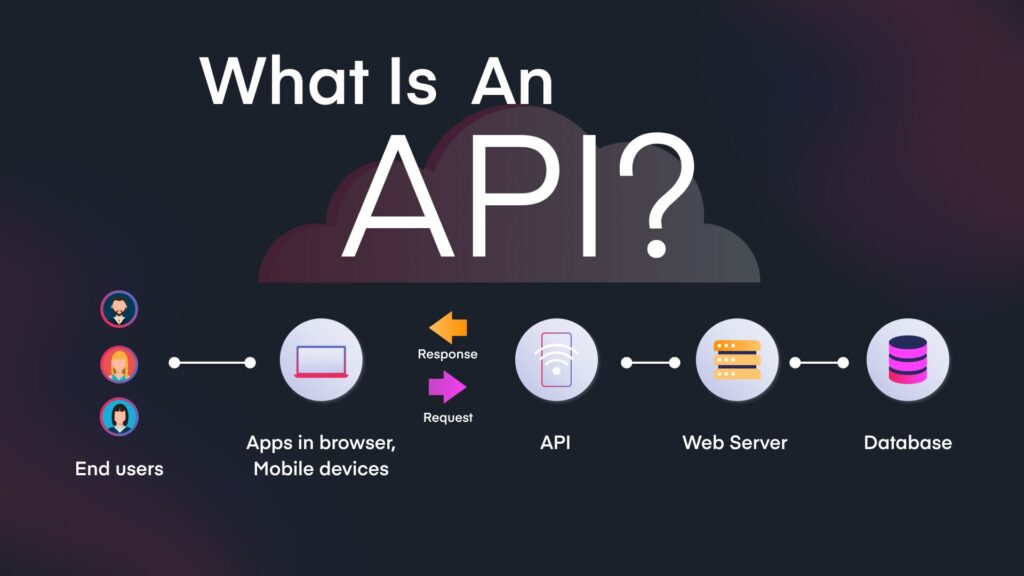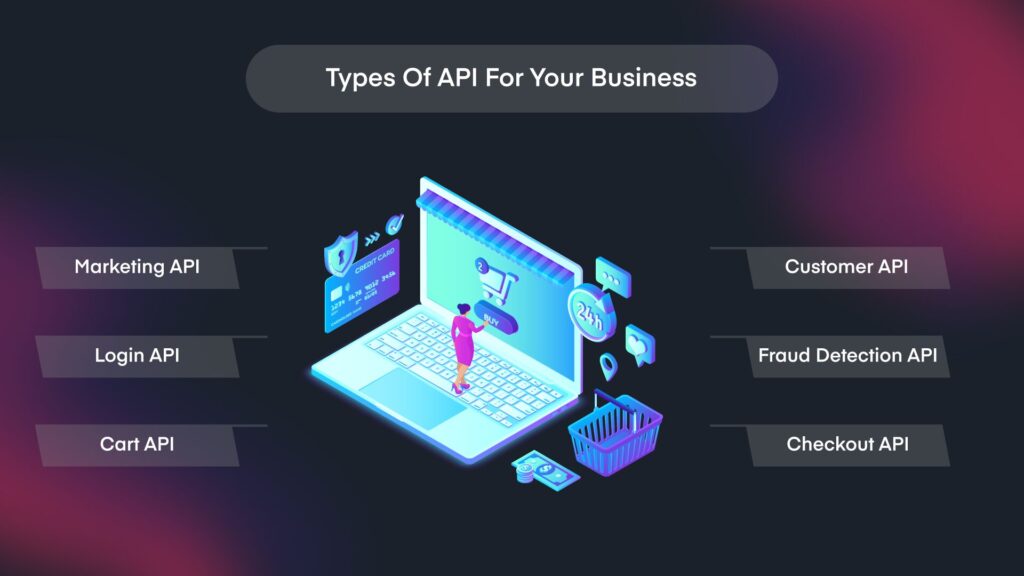6 Types of Ecommerce APIs and Their Benefits for Businesses
- Nov 1, 2023
- By Tarun

Estimated reading time: 6 minutes, 43 seconds
In the ever-evolving world of ecommerce, staying ahead of the competition and enhancing user experiences are paramount. One of the most powerful tools at your disposal for achieving this is the Application Programming Interface or API. Ecommerce APIs enable seamless integration between different software systems, offering a multitude of benefits for ecommerce businesses.
Wondering how it can benefit you or your eCommerce business? Go through this blog. Here, we’ll delve into the world of APIs and explore how they can significantly skyrocket your eCommerce sales.
What is an API?
Picture this: you’re in a bustling city, standing at an intersection. Cars, bicycles, and pedestrians are all moving in different directions, yet somehow, they navigate through the chaos smoothly. How is this possible? Traffic signals and road signs act as the behind-the-scenes coordinators, guiding everyone safely to their destinations. In the digital realm of software and applications, a similar role is played by Application Programming Interfaces, or APIs.

At its core, an API (Application Programming Interface) is like a digital bridge that connects different software systems, allowing them to communicate, collaborate, and share information seamlessly. Just as a translator helps two people who speak different languages understand each other, an API serves as a translator between different software applications. It’s the intermediary that ensures two systems “speak the same language,” enabling them to work together harmoniously.
Now that you have a thorough understanding of what is ecommerce API, let’s take a look at why you should use ecommerce API integration. Keep reading!
Why is API Used for Ecommerce Websites?
eCommerce Business websites are a dynamic ecosystem where multiple systems collaborate to deliver a seamless shopping experience. APIs play a pivotal role in this by enabling different parts of an eCommerce platform, such as the website, inventory management, payment gateways, and customer relationship management (CRM) systems, to communicate effectively. eCommerce API integration provide the means for real-time updates, data synchronisation, and the smooth flow of information between these systems.
Pro-Tip: Are you interested in learning more about the future of the ecommerce industry? Go through our blog!
How to Use Ecommerce APIs?
Now that you know why are ecommerce APIs necessary. Are you wondering how to use the API for eCommerce Sales? Let us get started!
1. Inventory Management: API integration can be used to connect your ecommerce website with your inventory management system. This ensures that product availability and pricing are always up to date, preventing the frustration of displaying out-of-stock items or incorrect prices to customers.
2. Payment Gateways: Integrating payment gateway APIs allows for secure and efficient payment processing. Payment API integration enables various payment methods, simplifying the checkout process and boosting customer trust.
3. Shipping and Tracking: APIs from shipping carriers enable real-time tracking and delivery status updates. This transparency enhances customer satisfaction and reduces post-purchase anxiety.
4. Personalisation: By integrating APIs with CRM systems, you can personalise the shopping experience based on customer data, purchase history, and preferences, leading to higher customer engagement and loyalty.
5. Checkout API: The checkout API enables customers to have a fast and reliable process. It provides multiple options for payment; save card details (if user prefer) for future reference. Users can get details of the payment, for instance, product charges, shipping charges, and other charges.
6. Third-Party Services: APIs also empower you to incorporate third-party services like social media platforms, reviews and ratings, and recommendation engines, enriching the overall user experience.
6 Types of API
Ecommerce offers different API types to ease connectivity with other systems. But do you think that is it? No, different APIs for ecommerce provide different functionality, customer experience, performance, and other benefits.

Let’s explore 6 most common eCommerce APIs types:
1. Marketing API: Marketing APIs help in automating the marketing process. It enables you to manage email marketing, social media marketing, data collection, query data, ads, and other tasks.
2. Login API: A login API helps manage the user identities. It enables the users to quickly log in with other accounts like Facebook, Google, G Suit, and from whatever platform they want the user to access. Users have the multiple and trustworthy options to log in to your website. This will build user trust in your business as well
3. Cart API: The website admins use cart API to create, view, and manage customers’ carts. It assists in managing tax, shipping prices, card payments, and many more things.
4. Customer API: A customer API gives a customised experience to the customer. With the help of name-value pairs of your customers, you can provide personal recommendations. It enables system integration for the quick transfer of trustworthy consumer data.
5. Checkout API: The checkout API enables customers to have a fast and reliable process. It provides multiple options for payment; save card details (if user prefer) for future reference. Users can get details of the payment, for instance, product charges, shipping charges, and other charges.
6. Fraud Detection API: This API helps in detecting if there are any fraud emails or phone numbers in the customer data. It enables you to prevent business loss. It is more scalable than manual fraud detection. Fraud Detection APIs make the process automated and flexible.
Benefits of Using APIs in an Ecommerce Business
Are you still looking for benefits of an API Integration for an Ecommerce Platform? Let us walk you through some of them!
- Enhanced User Experience: APIs facilitate seamless navigation, faster checkouts, accurate product information, and personalized recommendations, all of which contribute to a superior user experience that encourages repeat business.
- Real-time Updates: APIs ensure that your website always reflects real-time information, from product availability to shipping status. This eliminates discrepancies and fosters trust with customers.
- Scalability: As your ecommerce business grows, APIs can accommodate increased traffic and data without compromising performance. This scalability is crucial for managing surges during peak shopping seasons.
- Efficient Operations: API integrations automate various processes, such as inventory updates and order processing, reducing the likelihood of errors and freeing up your team to focus on strategic tasks.
- Competitive Advantage: Businesses that harness the power of APIs can swiftly adapt to market trends and customer demands, gaining a competitive edge in the dynamic ecommerce landscape.
How to Choose the Right eCommerce API for Your Business?
In today’s rapidly evolving digital landscape, establishing an online presence is essential for businesses to thrive. Whether you’re launching a new eCommerce platform or looking to upgrade your existing one, choosing the right eCommerce API (Application Programming Interface) is a critical decision.

Your API choice can significantly impact your website’s performance, scalability, and overall user experience. In this guide, we’ll walk you through the key factors to consider when selecting the perfect eCommerce API for your business needs.
Here is a look at the steps you need to take before choosing the best API ecommerce platform for your online business!
1. Define Your Business Objectives:
Before diving into the world of eCommerce APIs, it’s crucial to have a clear understanding of your business objectives. What are your short-term and long-term goals? Do you plan to sell physical products, digital downloads, or services? Understanding your business’s unique requirements will help you choose an API that aligns with your goals. Consider the factors such as inventory management, payment processing, and shipping logistics.
2. Scalability:
Integrating payment gateway APIs allows for secure and efficient payment processing. Payment API integration enables various payment methods, simplifying the checkout process and boosting customer trust. Your eCommerce sales isn’t static; it will likely grow over time. Therefore, it’s vital to select an API that can scale with your business. Look for APIs that offer scalability in terms of handling increased traffic, product listings, and customer data. Ensure that the API can handle peak loads during sales events and seasonal fluctuations.
3. Integration Capabilities:
Your eCommerce API should seamlessly integrate with other software and services you use, such as CRM systems,payment gateways, and marketing tools. Therefore, evaluate the compatibility of the API with popular third-party applications. A well-integrated ecosystem can streamline your business operations and enhance customer experience.
4. Security and Compliance:
Security is paramount in eCommerce. Ensure that the API you choose complies with industry-standard security practices, such as PCI DSS for payment processing. Look for features like data encryption, authentication mechanisms, and regular security updates. Your customers’ trust depends on the safety of their personal and financial information.
5. Performance:
Website speed and performance are critical for user satisfaction and SEO rankings. Assess the API’s performance metrics, such as response times and latency. Opt for an API that can deliver fast and reliable performance to provide a seamless shopping experience for your customers.
6. Documentation and Support:
Comprehensive documentation is essential for developers working with the API. Look for an eCommerce API provider that offers clear and up-to-date documentation, including code examples and tutorials. Additionally, evaluate the level of support available. Responsive customer support can be a lifesaver when you encounter technical issues or need assistance with integration.
7. Cost Considerations:
Consider your budget when selecting an eCommerce API. Some APIs for large companies. may have upfront costs, while others operate on a subscription or transaction-based pricing model. Be sure to account for all potential costs, including any fees associated with third-party integrations, and evaluate whether the chosen API offers good value for your business.
8. User Experience:
Finally, prioritize the user experience. The API you choose should enable you to create a user-friendly and visually appealing online store. Assess the flexibility and customisation options available to ensure you can tailor the shopping experience to your target audience.
In conclusion, choosing the right eCommerce API is a crucial step in building a successful online store. By defining your business objectives and considering scalability, integration capabilities, security, performance, documentation, costs, and user experience, you’ll be well-equipped to make an informed decision.
Remember that the right API for ecommerce can empower your eCommerce business to thrive in the digital marketplace.
Conclusion
APIs have emerged as a driving force behind the success of modern ecommerce sales. By seamlessly connecting different systems, APIs optimise operations, enhance user experiences, and boost sales. As you navigate the ever-changing world of ecommerce, harnessing the capabilities of APIs can truly be the game-changer that propels your business to new heights.
We hope that this blog has cleared all your doubts regarding API integration for ecommerce website. However, if you still have any doubts regarding API for ecommerce or eCommerce website development company. then, you can contact us! We at RVS Media are always available for you.
 Shopify
Shopify

















